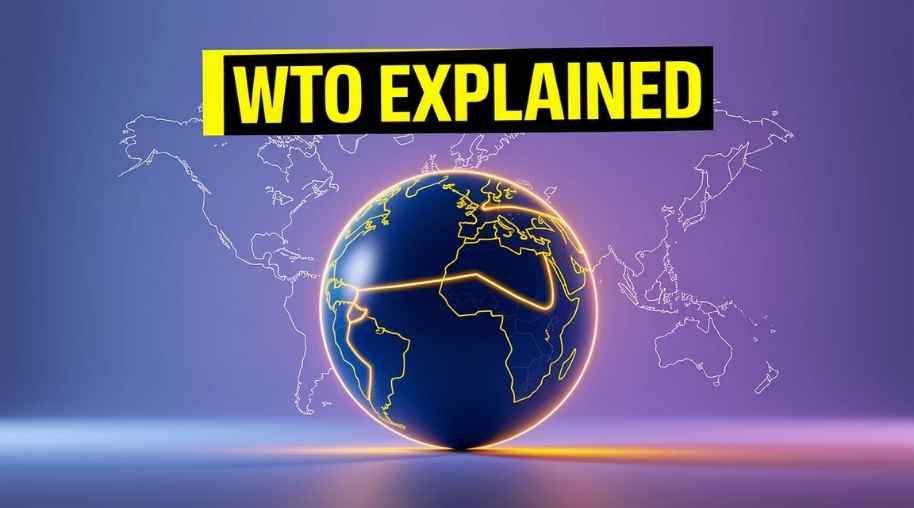WTO Full Form-World Trade Organization
by Shashi Gaherwar
0 2528
The World Trade Organization (WTO): Facilitating Global Trade
The World Trade Organization (WTO) is an international body that regulates and promotes global trade among its 164 member countries. Established in 1995, the WTO ensures smooth, free, and predictable trade by setting rules, resolving disputes, and fostering economic cooperation.

The WTO plays a pivotal role in driving global economic growth, reducing trade barriers, and protecting intellectual property rights. This article explores its history, functions, principles, dispute resolution mechanisms, and challenges.
History and Establishment of WTO
The WTO was formed on January 1, 1995, succeeding the General Agreement on Tariffs and Trade (GATT), which governed global trade since 1948. Headquartered in Geneva, Switzerland, its agreements cover goods, services, and intellectual property.
Key Milestones:
- 1948: GATT is established to regulate international trade.
- 1986-1994: The Uruguay Round of trade negotiations leads to the creation of the WTO.
- 1995: The WTO officially replaces GATT as the global trade governing body.
- 2001: The Doha Development Round is launched to address trade issues in developing countries.
Core Functions of the WTO
The WTO performs several critical roles to facilitate international trade:
- Administering Trade Agreements: Ensures member nations comply with rules covering tariffs, trade barriers, services, and intellectual property.
- Resolving Trade Disputes: The Dispute Settlement Mechanism (DSM) resolves conflicts, preventing unilateral trade retaliation.
- Reducing Trade Barriers: Works to lower tariffs and eliminate non-tariff barriers, fostering global supply chain stability.
- Monitoring Global Trade: Evaluates trade policies and publishes reports on trade statistics and economic trends.
- Capacity Building for Developing Nations: Provides technical assistance to developing and least-developed countries (LDCs) to enhance trade opportunities.
Principles of the WTO
The WTO operates on foundational principles to ensure fair and open trade:
- Non-Discrimination: The Most Favored Nation (MFN) principle prevents discrimination among trading partners, and National Treatment ensures equal treatment of foreign and domestic goods.
- Free Trade through Negotiation: Encourages multilateral agreements to reduce trade barriers.
- Predictability & Transparency: Promotes stable trade policies and requires notification of regulation changes.
- Encouraging Competition: Prevents unfair practices like dumping and ensures fair pricing.
- Special Treatment for Developing Countries: Offers longer transition periods and support to boost exports in weaker economies.
WTO Dispute Settlement Mechanism
A key function of the WTO is resolving trade disputes through its structured process:
- Consultation Phase: Countries attempt to resolve disputes through direct negotiations.
- Panel Review: A panel of trade experts reviews unresolved cases.
- Ruling & Appeal: A decision is issued, with appeals handled by the Appellate Body.
- Implementation & Compliance: The losing party must comply or face trade sanctions.
The WTO has resolved major disputes involving steel tariffs, agricultural subsidies, and technology trade restrictions.
Impact of WTO on Global Trade
The WTO has significantly shaped the global economy:
- Increased Global Trade Volume: Policies have expanded trade, with tariff reductions making goods more accessible.
- Economic Growth & Job Creation: Open markets have driven industrial expansion, exports, and job creation.
- Protection of Intellectual Property: The TRIPS Agreement ensures fair protection for copyrights, patents, and trademarks.
- Fair Competition: Prevents unfair subsidies, tariffs, or dumping, maintaining stable global pricing.
Challenges Facing the WTO
Despite its successes, the WTO faces significant challenges:
- Trade Wars & Protectionism: Disputes like the US-China trade war and rising tariffs threaten free trade.
- Slow Decision-Making: Consensus-based decisions delay progress, with the Doha Round remaining incomplete.
- Dispute Settlement Crisis: A shortage of Appellate Body judges causes delays, and countries bypass rules via bilateral agreements.
- Balancing Interests of Developing Nations: Small economies struggle to compete, requiring reforms to enhance trade benefits.
Future of the WTO
To remain effective, the WTO must adapt to modern challenges:
- Reforming Dispute Resolution: Streamline mechanisms to resolve conflicts faster.
- Digital Trade Regulations: Address e-commerce and digital trade policies.
- Strengthening Fair Trade Policies: Combat unfair subsidies and currency manipulation.
- Green Trade Policies: Promote sustainable trade to address climate change.
The World Trade Organization (WTO) is vital for ensuring fair, transparent, and rule-based global trade. By promoting trade liberalization, dispute resolution, and economic development, it has significantly contributed to global economic growth. However, challenges like protectionism and slow reforms require the WTO to evolve, ensuring a sustainable and inclusive global economy.
Further Learning Resources
If you’re passionate about building a successful blogging website, check out this helpful guide at Coding Tag – How to Start a Successful Blog. It offers practical steps and expert tips to kickstart your blogging journey!
For dedicated UPSC exam preparation, we highly recommend visiting www.iasmania.com. It offers well-structured resources, current affairs, and subject-wise notes tailored specifically for aspirants. Start your journey today!

Share:









Comments
Waiting for your comments